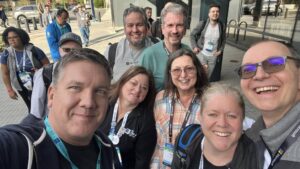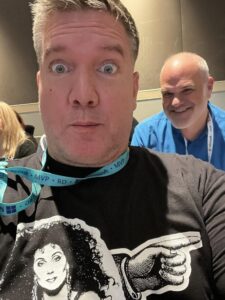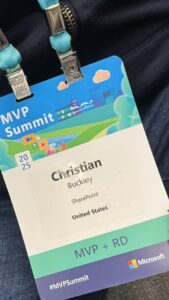Reflections from the 2025 MVP & RD Summit
 Last week, I had the opportunity to attend the 2025 MVP & RD Summit at Microsoft headquarters in Redmond, Washington. As always, the event was packed with deep technical sessions, strategic insights, and candid conversations with product teams and fellow community leaders. While the content itself was under NDA, what I can share are the broader themes that came through across the sessions I joined and the discussions I had—many of which reinforced the direction I’ve already been heading over the past year.
Last week, I had the opportunity to attend the 2025 MVP & RD Summit at Microsoft headquarters in Redmond, Washington. As always, the event was packed with deep technical sessions, strategic insights, and candid conversations with product teams and fellow community leaders. While the content itself was under NDA, what I can share are the broader themes that came through across the sessions I joined and the discussions I had—many of which reinforced the direction I’ve already been heading over the past year.
These five themes didn’t just surface repeatedly—they aligned directly with the projects I’ve been working on, and the sessions I’m planning for conferences and community events in the months ahead. Here’s a look at the key takeaways that resonated most with me.
1. AI-First Business and Marketing Transformation
 One clear thread running through the event was how AI-first thinking is no longer optional—it’s foundational. Whether we were talking about product strategy, marketing execution, or customer support, AI is becoming the core engine that drives scale, speed, and personalization.
One clear thread running through the event was how AI-first thinking is no longer optional—it’s foundational. Whether we were talking about product strategy, marketing execution, or customer support, AI is becoming the core engine that drives scale, speed, and personalization.
The conversations made it clear: organizations that embrace AI not just as a tool, but as a strategic lens, are the ones unlocking new value. From hyper-personalized marketing content to AI-powered sales insights, businesses are rethinking how they operate and connect with customers. This strongly validated the frameworks I’ve been developing to help clients shift toward AI-integrated go-to-market strategies.
2. Microsoft 365 and Copilot as Drivers of Collaboration and Innovation
 The evolution of Microsoft 365 and the Copilot ecosystem is reshaping how teams work together. It’s been almost 20 years since being accepted into a doctoral program where I had planned to focus on the social informatics around collaboration, and, specifically, study how technology was/is changing the ways in which teams/orgs work together. I delayed my start twice and lost my placement, and soon after started at Microsoft…and just never looked back. But boy, I was spot-on for where the market was going!
The evolution of Microsoft 365 and the Copilot ecosystem is reshaping how teams work together. It’s been almost 20 years since being accepted into a doctoral program where I had planned to focus on the social informatics around collaboration, and, specifically, study how technology was/is changing the ways in which teams/orgs work together. I delayed my start twice and lost my placement, and soon after started at Microsoft…and just never looked back. But boy, I was spot-on for where the market was going!
At the Summit, what stood out was how much of the conversation is no longer just about productivity—it’s about creativity, inclusion, and agility. The focus is now on how these tools are enabling collaboration across boundaries—across departments, time zones, and even languages. Copilot isn’t just summarizing emails or drafting documents; it’s nudging decisions forward, highlighting patterns, and surfacing ideas that might otherwise get buried.
For those of us supporting organizational change and digital workplace strategies, this shift validates the investment in modern governance models and training plans that go beyond tool adoption. It’s about preparing people and processes for a new kind of collaboration culture.
3. Content Creation, Automation, and Dynamic Communication Strategies
 Content strategy is being rewritten in real-time. I’ve been working on a related book for over 3 years on content strategy, and am going back through and inserting the AI perspective throughout as its been a major shift in this space. AI is not just accelerating content creation—it’s transforming how we think about communication at scale. The challenge now is maintaining authenticity and alignment when machines are doing more of the heavy lifting.
Content strategy is being rewritten in real-time. I’ve been working on a related book for over 3 years on content strategy, and am going back through and inserting the AI perspective throughout as its been a major shift in this space. AI is not just accelerating content creation—it’s transforming how we think about communication at scale. The challenge now is maintaining authenticity and alignment when machines are doing more of the heavy lifting.
What I found encouraging is that the focus wasn’t just on automation for efficiency’s sake. There was real emphasis on dynamic content strategies—where messages evolve based on audience behavior, where internal and external communications feel connected, and where creators stay in the loop rather than being replaced. Of course, this is very much in alignment with modern digital marketing concepts, but now within the rest of the modern workplace.
This theme aligns directly with my recent work on scalable content frameworks and AI-assisted storytelling that I’ve been presenting at recent conferences. The goal remains the same: create meaningful connections—but now with tools that help us move faster and smarter.
4. AI-Driven Project Management and Organizational Change
 Another strong undercurrent was the role AI is playing in how organizations plan and execute change. Whether it’s managing cloud migrations, deploying new solutions, or transforming legacy processes, AI is emerging as a strategic partner in project management.
Another strong undercurrent was the role AI is playing in how organizations plan and execute change. Whether it’s managing cloud migrations, deploying new solutions, or transforming legacy processes, AI is emerging as a strategic partner in project management.
Think beyond task lists and Gantt charts. We’re talking about AI flagging risk patterns, suggesting process optimizations, or helping project leads anticipate blockers before they surface. It’s a more proactive, data-driven approach to change—something that’s sorely needed as businesses take on more complex transformations.
This theme supports my ongoing work around turning modernization efforts into business strategy opportunities, not just IT tasks. AI adds the insight layer that makes that leap possible. I’m excited to be speaking on this topic alongside good friend and fellow MVP Shari Oswald (@shortcutshari) in a couple weeks in Denver at Comms vNext.
5. Governance, Privacy, and Responsible AI Adoption
 As exciting as the AI innovation is, there was no shortage of emphasis on governance and responsibility. In fact, the strongest conversations often weren’t about what AI can do—they were about what it should do.
As exciting as the AI innovation is, there was no shortage of emphasis on governance and responsibility. In fact, the strongest conversations often weren’t about what AI can do—they were about what it should do.
Discussions around data privacy, model bias, and organizational transparency were not just afterthoughts—they were central to the roadmap conversations. As adoption of tools like Copilot accelerates, businesses are realizing that governance needs to catch up fast, especially when large language models are embedded into core workflows.
This aligns perfectly with the governance models I’ve been building and refining—ones that balance innovation with accountability, especially in regulated industries or large enterprises with complex compliance needs.
Looking Ahead
What I walked away with from the MVP & RD Summit was a deep sense of validation. The themes above aren’t just trends—they’re the reality on the ground. They’re showing up in client conversations, project roadmaps, and community feedback.
I’ll be leaning into these topics throughout the year, both in the work I’m doing with organizations and in the sessions I’m delivering at events. From AI-led business transformation, to Copilot adoption strategies, to ethical AI governance frameworks—these are the conversations we need to be having, and I’m glad to be a part of pushing them forward.
If you’re tackling any of these challenges in your own organization, let’s connect.




